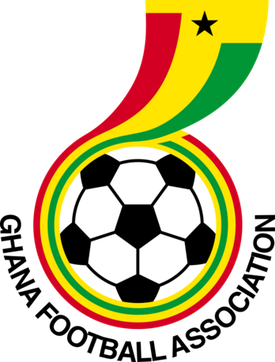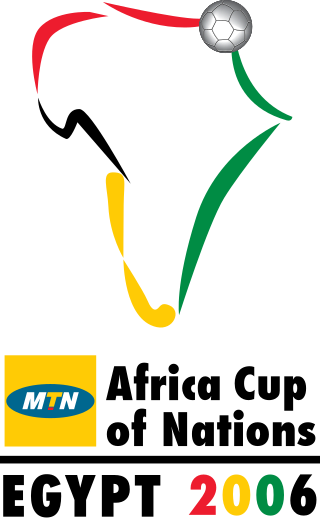
The Africa Cup of Nations commonly referred to as the TotalEnergies Africa Cup of Nations for sponsorship reasons, or simply AFCON or CAN, is the main international men's association football competition in Africa. It is sanctioned by the Confederation of African Football (CAF) and was first held in 1957. Since 1968, it has been held every two years, switching to odd-numbered years in 2013.
The Egypt national football team, nicknamed "Pharaohs", represents Egypt in men's international football, and is governed by the Egyptian Football Association (EFA), the governing body of football in Egypt.

The Algeria national football team represents Algeria in men's international football, and is governed by the Algerian Football Federation. The team plays their home matches at the 5 July Stadium in Algiers and Miloud Hadefi Stadium in Oran. Algeria joined FIFA on 1 January 1964, a year and a half after gaining independence. They are the current champions of the FIFA Arab Cup.

The Ghana national football team represents Ghana in men's international football. The team is named the Black Stars after the Black Star of Africa in the flag of Ghana. It is governed by the Ghana Football Association, the governing body for football in Ghana. Prior to 1957, it played as the Gold Coast.
The Ivory Coast national football team represents Ivory Coast in men's international football. Nicknamed the Elephants, the team is managed by the Ivorian Football Federation (FIF). The team has won the Africa Cup of Nations three times, in 1992, 2015 and 2024, and has qualified for the FIFA World Cup three times, in 2006, 2010, and 2014.

The Angola national football team represents Angola in men's international football and is controlled by the Angolan Football Federation. Nicknamed Palancas Negras, the team is a member of both FIFA and the Confederation of African Football (CAF).

The Libya national football team represents Libya in men's international association football and it is controlled by the Libyan Football Federation. The team has never qualified for FIFA World Cup but has qualified for editions of Africa Cup of Nation in 1982, 2006, and 2012. In 1982, the team was both the host and runner-up. In the Arab Cup, Libya finished second in 1964 and 2012, and third in 1966. The team is affiliated with both FIFA and Confederation of African Football (CAF).

The 2006 Africa Cup of Nations was the 25th edition of the Africa Cup of Nations, the association football championship of Africa. It was hosted by Egypt, from 20 January to 10 February. Just like in 2004, the field of sixteen teams was split into four groups of four. Egypt won its fifth championship, beating Ivory Coast in the final 4–2 in a penalty shootout after a goalless draw.
The Mozambique national football team represents Mozambique in men's international football competitions and is controlled by the Mozambican Football Federation, the governing body for football in Mozambique. Mozambique have never qualified for a FIFA World Cup, but they have qualified for five Africa Cup of Nations in 1986, 1996, 1998, 2010, and most recently 2023, being eliminated in the first round in all five. In 1997, the Mozambique Football Federation became a founding member of COSAFA.

The Burundi national football team, nicknamed The Swallows, represents Burundi in international football and is controlled by the Football Federation of Burundi. The team has never qualified for the World Cup. Burundi previously did come very close to qualifying for the 1994 Africa Cup of Nations, losing only on penalties to Guinea in a playoff. However, in 2019, it qualified for the first time, and took part in the Africa Cup of Nations finals in Group B, but lost all its matches and left from the group stage without scoring a single goal.
The Equatorial Guinea national football team represents Equatorial Guinea in men's international football and is controlled by the Equatoguinean Football Federation, a member of the Confederation of African Football (CAF).

The Cairo International Stadium, formerly known as Nasser Stadium, is an Olympic-standard, multi-use stadium with an all-seated capacity of 75,000. The architect of the stadium is the German Werner March, who designed the Olympic Stadium in Berlin from 1934 to 1936. The engineering and construction supervision of the stadium was performed by ACE Moharram Bakhoum. It is the 69th largest stadium in the world and the 3rd largest stadium in Egypt. Located in Nasr City; a suburb north east of Cairo, it was completed in 1960, and was inaugurated by President Gamal Abd El Nasser on 23 July that year which coincided with the eighth anniversary of the Egyptian Revolution of 1952

Boubacar "Copa" Barry is an Ivorian former professional footballer who played as a goalkeeper. Having begun his career at ASEC Mimosas, he moved to France in 2001, where he played for Rennes' reserve team. In 2003, he joined Belgian side Beveren where he stayed four years. He then spent ten years at K.S.C. Lokeren Oost-Vlaanderen amassing 239 league appearances. At international level, he played for the Ivory Coast national team before his retirement from international football in March 2015, but continued to play for his club, Lokeren. Exactly four years after his international retirement, Barry retired also professionally as a player in March 2019.

Mohamed Mohamed Mohamed Aboutrika is an Egyptian retired professional footballer who played as an attacking midfielder and a forward. He was voted second place in the African Footballer of the Year award in 2008, and was one of five nominees for the 2006 award, and one of the ten nominated for the 2013 award.
The Egypt women's national football team, nicknamed "the Cleopatras", represents Egypt in international women's football. It is managed by the Egyptian Football Association, the governing body of football in the country.
This page provides summaries of the CAF third round matches for the 2014 FIFA World Cup qualification. The ten group winners from the second round were drawn into five home-and-away ties.

The 2019 Africa Cup of Nations, known as the Total2019 Africa Cup of Nations for sponsorship reasons, was the 32nd edition of the Africa Cup of Nations, the biennial international men's football championship of Africa organized by the Confederation of African Football (CAF). The tournament was hosted by Egypt. The competition was held from 21 June to 19 July 2019, as per the decision of the CAF Executive Committee on 20 July 2017 to move the Africa Cup of Nations from January/February to June/July for the first time. It was also the first Africa Cup of Nations expanded from 16 to 24 teams.

The 2019 Africa U-23 Cup of Nations was the third edition of the Africa U-23 Cup of Nations, the quadrennial international age-restricted football championship organised by the Confederation of African Football (CAF) for the men's under-23 national teams of Africa. It was hosted by Egypt between 8 and 22 November 2019.
Ivory Coast is one of Africa's major forces in the Africa Cup of Nations. Ivory Coast has won the tournament three times, most recently as hosts in 2023. They previously won in 1992 and 2015. Ivory Coast has also finished as runner up twice, in 2006 and 2012.












